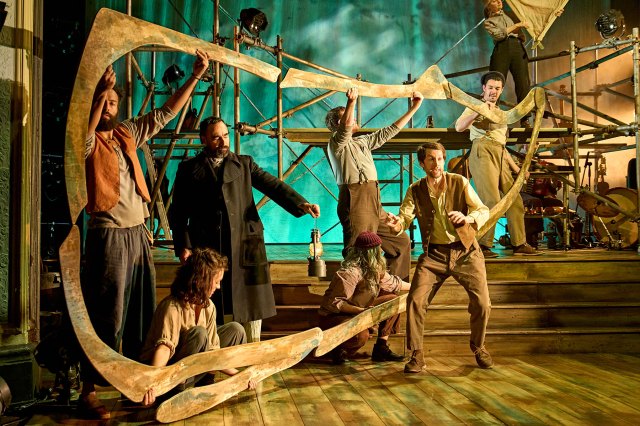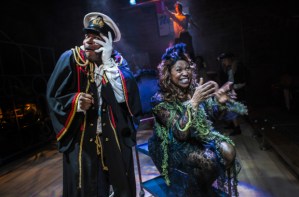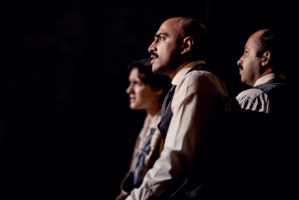Simple8’s Moby Dick at Wilton Music Hall and on tour – review
Sebastian Armesto’s stage adaptation continues its tour through to 22 June

In Herman Melville’s Great American classic Moby Dick, provincial schoolmaster Ishmael runs away to sea in search of adventure. But as this adaptation by Sebastian Armesto skilfully demonstrates, the story is a slow burn that requires patience, rather than a swashbuckling adventure. Aboard ship, Ishmael and his crew are forced to reckon with a barrage of emotions: excitement, fear, boredom, frustration, pride and more.
Simple8’s production was first staged over a decade ago and, as the programme note explains, there has been a global pandemic since, imbuing the central theme of solitude with a new resonance. Director Jesse Jones’s production emphasises the significance of teamwork. The charmingly dilapidated Wilton’s Music Hall, furthermore, once entertained workers from the nearby docks, who probably would have had a lot in common with Melville’s cast of seafarers.
As the plucky, naïve Ishmael, Mark Arends is our guide to the story. The opening section charting his sleeping arrangements on the night before he joins the ship could be condensed but there’s a notable moment in which Ishmael and Tom Swale’s noble Queequeg are “married” – not as a husband and wife but as brothers.
Kate Bunce’s strikingly stark design comprises a framework of industrial scaffolding, with planks of wood further constructed to form the Pequod. The music by Jonathan Charles, which includes the double bass, violin, guitars and penny whistle, is integrated effectively, and the lighting design by Johanna Town conveys a sense of all weathers.
Many American high schoolers are required to toil through Melville’s extensive tome with its wealth of symbolism and detailed passages. It has never been on any of my reading lists, so I appreciated the education. It becomes apparent that the whale is exceptional not only on account of its size and the oil it produces but by the notion that, like human beings, it’s touched by God. There is a sequence in which Ishmael steps back into his role as a teacher to explain how the sperm whale’s head contains the purest oil, while the ensemble forms the outline using pieces of wood. Rather than being dry, it’s quite fascinating.
Guy Rhys brings saturnine intensity to Captain Ahab, who hobbles on an ivory leg having lost that limb to the great white whale and is personally affronted by the way in which the captain of a British ship has an onwards and upwards attitude towards losing an arm to the same beast. The human capacity to formulate self-destructive obsessions is the real enemy here.
Many of the accents sound more Irish than American but overall the scrappy elements are endearing. Charles Dickens’ similarly epic Our Mutual Friend is running at the National Theatre as London Tide at the moment, but this is the more compelling and imaginatively staged literary adaptation currently playing in the capital.
Captain Ahab isn’t fit to be captain because he’s working for himself, not the team. In contrast, this production is a fine example of ensemble work, with its performances and creativity blending together like the rugged harmonies of its sea shanties.















